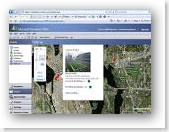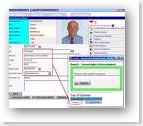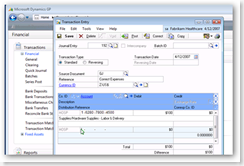A couple weeks ago I attended the CRM (Customer Relations Management - MS Dynamics) launch here in Huntington Beach, California. I was surprised at the turn out as the room was full...I sat next to an individual who was in sales and couldn't tell me how much time he has gained back in being able to be back out in front of customers instead of doing paperwork and how he connects from the field easily to create short updates. He told me it has really helped increase his sales.
When you stop and think about the process of selling and implementing both types of applications, there are many similarities...both are record keeping applications, both link to additional  information, they have reports, and most importantly both allow the users to drill down to find the information needed, as well as providing a user friendly method for data input.
information, they have reports, and most importantly both allow the users to drill down to find the information needed, as well as providing a user friendly method for data input.
The biggest issue with both too, getting people to use the software, in that part of the scenario, the same issue exists.
One other huge benefit from both is the ability to incorporate data from additional software, called integration. We keep hearing this word "integration" today and it is quickly becoming the  foundation as to how we maximize the use not only of our time, but the ability to create good decisions. CRM software is building a data base much like an EMR, but is not necessarily health care critical, but again information is entered and queried in much the same fashion. One of the larger expenditure items on the agenda this year for small and medium size companies is the addition of CRM and Business Intelligence software to help speed up the process of mining and finding information with a couple of clicks instead of having to go to many sources for the same.
foundation as to how we maximize the use not only of our time, but the ability to create good decisions. CRM software is building a data base much like an EMR, but is not necessarily health care critical, but again information is entered and queried in much the same fashion. One of the larger expenditure items on the agenda this year for small and medium size companies is the addition of CRM and Business Intelligence software to help speed up the process of mining and finding information with a couple of clicks instead of having to go to many sources for the same.
Doing manual studies and creating reports from a myriad of sources is just as time consuming if not moreso than using paper patient charts, and just as cumbersome to have to fill filing cabinets full of paper folders. We all focus on the "paper chart" doctor and how to convert to electronic records, when in fact there are just as many businesses out there still going about managing their business in the same fashion - on paper and requiring employees to manually handle folders and files, or having one big hard drive full of documents to have to manually search, much less copy and paste to move to another program or document. Both CRMs and EMRs need document management as well for those items that do not have tabled information that can be stored in a program. SharePoint can help to eliminate some of this and secure documents at the same time.
The one big ticket that seems to be overlooked is employee time, to have to manually work with files that are not either in an organized EMR or CRM system. I see that in both health care and in other types of businesses. Employee time is the factor that will kill you with lack of efficiency and duplicating efforts. With integration, you get the best of both worlds. Enterprises have been doing this for many years, as you pretty much expect your phone carrier today to have their fingertips on every bit of information regarding your account...and they do.
There is also the possibility of EMRs and CRM working together...when you stop and think about some of the possibilities. The CRM can keep track let's say of your vendors, maybe the medication you need to keep on hand and what you spend for vaccines as an example, with some integration you will be able to further drill down and see actually how many patients required the vaccine, how often, and be able to make intelligent decisions as to how much you will spend in a year, or create a projected budget, complete with cost, based on combined information from both elements. This article from a prior post goes into additional detail about Business Intelligence and EMR/EHR integration. 
Microsoft also has CRM software directly related to health care...there are also open source solutions available. CRM software integrates where it is supposed to be, with email. Even some of the open source solutions will also integrate with Outlook.
In short, healthcare gets all the attention of being farther behind the rest of the business world for not being in the digital age; however, other businesses face the same challenges and there's more small to medium size businesses that haven't capitalized on being digital yet as well. The real winner though for healthcare is to combine and maximize both to not only have digital records, but get grip on how the practice or hospital is operating in real time to make accurate and concise decisions quickly without an undue amount of time relegated to manually producing the same, the clock is ticking away and every minute counts. A few clicks of the mouse is a lot faster and much more efficient than hours of rummaging through paper records, medical or otherwise.



0 comments :
Post a Comment